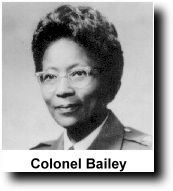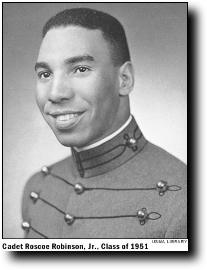Military History Facts
First African-American Female Colonel
 World War II brought out the best in America's s young people. Young African-American women like Margaret E. Bailey found it an opportunity to fight for their citizenship, their democracy, and their pride. By May 1943, 183 African-American nurses held commissions in the Army Nurse Corps. During World War II, African-American nurses served in all theaters of the war including Africa, Burma, Australia, and England. At the conclusion of World War II, about 600 African-American nurses had served. One of these nurses, Margaret E. Bailey, accepted a commission in June 1944. On July 15, 1964, Bailey became the first African American promoted to lieutenant colonel in the Army Nurse Corps. In 1970, she was promoted to full colonel.
World War II brought out the best in America's s young people. Young African-American women like Margaret E. Bailey found it an opportunity to fight for their citizenship, their democracy, and their pride. By May 1943, 183 African-American nurses held commissions in the Army Nurse Corps. During World War II, African-American nurses served in all theaters of the war including Africa, Burma, Australia, and England. At the conclusion of World War II, about 600 African-American nurses had served. One of these nurses, Margaret E. Bailey, accepted a commission in June 1944. On July 15, 1964, Bailey became the first African American promoted to lieutenant colonel in the Army Nurse Corps. In 1970, she was promoted to full colonel.
Throughout her 27-year career in the Army, Col. Margaret E. Bailey advocated for the integration of the Army, to include the integration of all military housing, working environments, and recreational facilities. Following her retirement in 1971, Bailey became a consultant to the surgeon general to promote increased participation by minority group members in the Army Nurse Corps.
First African-American 4-Star General
 In 1947, Roscoe Robinson Jr. attended St Louis University for only a year before he transferred to the U.S. Military Academy at West Point. He graduated with a degree in military engineering in 1951. During the next 34 years, he would become a distinguished combat commander and the first African American to become a four-star general.
In 1947, Roscoe Robinson Jr. attended St Louis University for only a year before he transferred to the U.S. Military Academy at West Point. He graduated with a degree in military engineering in 1951. During the next 34 years, he would become a distinguished combat commander and the first African American to become a four-star general.
After graduating he served in the Korean War in 1952 as a platoon leader and rifle company commander. For his actions he received the Bronze Star. After returning to the United States a year later, he became an instructor in the Airborne Department of the U.S. Army Infantry School. Robinson then went on to graduate from the Command and General Staff College at Fort Leavenworth, Kan., in 1963. The following year he received his master's degree from the University of Pittsburgh in international affairs. In 1967 he served as battalion commander in Vietnam. For his achievements there he received the Legion of Merit, the Distinguished Flying Cross, 11 Air Medals, and two Silver Stars.
After Vietnam he served at the National War College for three years as the executive officer to the chief of staff. He was promoted to brigadier general and in 1975 became commanding general of the U.S. Army Garrison, Okinawa. He also commanded the 82nd Airborne Division at Fort Bragg, N.C. His final assignment was as U.S. military representative to the NATO Military Committee from 1982-1985.
After he had completed 34 years of service to the U.S. military, Robinson retired in 1985.
He was then awarded with the Defense Distinguished Service Medal and two Distinguished Service Medals. After his retirement, he was asked to oversee a panel tasked to examine the Korean War performance of some African-American Army units that had been highly criticized. After a battle with leukemia, Gen. Roscoe Robinson Jr. died on July 22, 1993 at the age of 64, and was buried at Arlington National Cemetery. In April 2000 a new auditorium, the "General Roscoe Robinson Jr. Auditorium," was named in his honor. The Roscoe Robinson Health Clinic at Womack Army Medical Center at Fort Bragg is also named in his honor.
Back Forward
